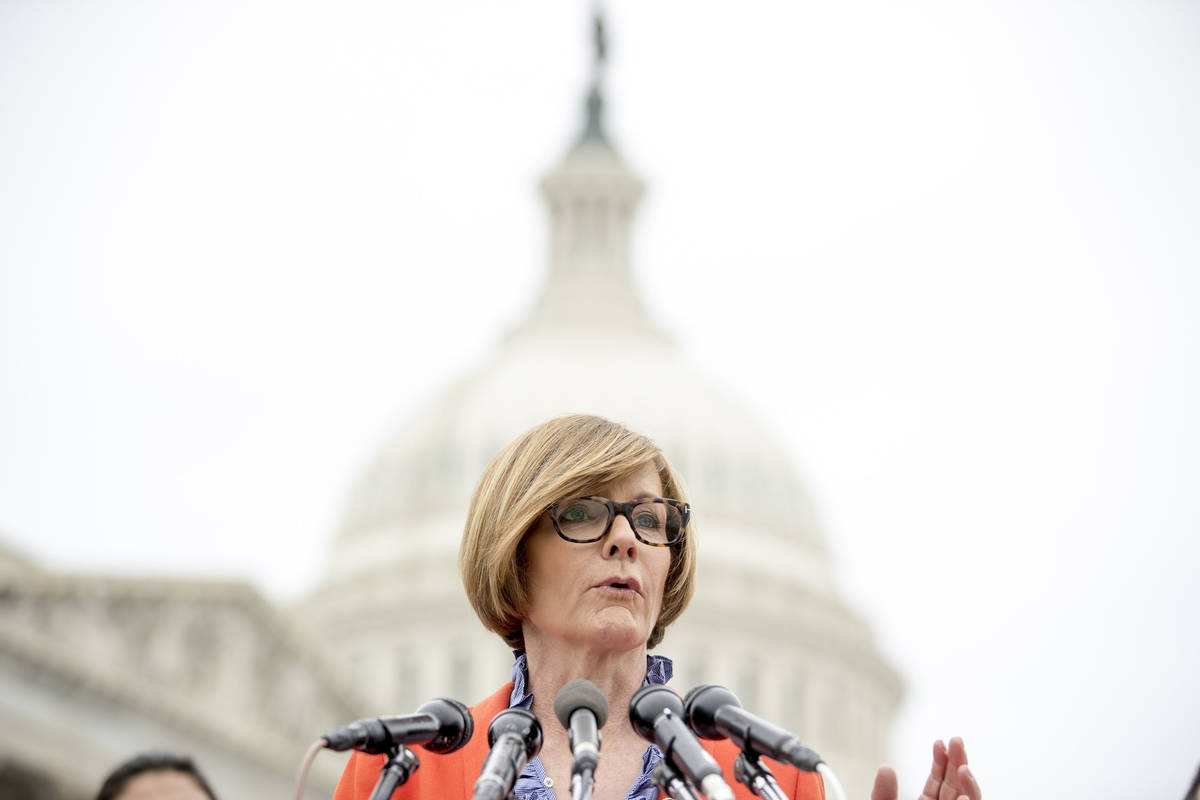Republicans, Democrats far apart on coronavirus relief
WASHINGTON — Lawmakers and the White House remain at loggerheads over a coronavirus stimulus package, but they face critical deadlines to pass legislation needed to curb a rise in deaths and infections and to stabilize a battered economy.
“Let’s get this done,” said Rep. Susie Lee, D-Nev., whose congressional district in hard-hit Nevada includes Henderson and Boulder City.
After the House passed a $3 trillion package months ago, a $1 trillion gap remains between congressional Democrats, the Trump administration and Senate Republicans.
Both sides have continued to bicker over details of a consensus bill and cast blame for the failure to move on legislation widely anticipated by businesses, workers, renters, schools and states and cities.
The Senate could vote next week on its $1 trillion proposal, placing pressure on Democrats, who are in negotiations with Treasury Secretary Steven Mnuchin and White House chief of staff Mark Meadows.
But House Speaker Nancy Pelosi, D-Calif., has all but ruled out a piecemeal approach to delivering federal help to those in need.
Following a 36-minute telephone call between Mnuchin and Pelosi, the two sides appeared no closer to finding consensus that would allow Congress to pass a relief bill the president would sign.
Pelosi said there remain “serious differences,” even after Democrats offered to come down $1 trillion and Republicans offered to come up $2.2 trillion in spending.
Need for relief
Lawmakers in both major political parties agree federal assistance is needed as a federal extension of $600 in unemployment payments has ended, an eviction moratorium has expired, businesses need help and states and cities seek assistance to avoid layoffs of essential workers.
The impact in Nevada has been acute, with casino, hotel and entertainment venues closed and employees furloughed because of the pandemic.
Unemployment in Nevada has been particularly high, with the expiration of federal relief for those out of work touching major cities such as Las Vegas, Henderson and Reno.
“That relief expired a month ago, and Americans are still waiting on us to act. Time is up,” said Lee, who like other Democrats in the congressional delegation supports the House-passed bill.
Nevada Gov. Steve Sisolak, a Democrat, stepped in and extended the moratorium on evictions last week.
Days later, President Donald Trump used his executive powers to extend the eviction moratorium and provide some unemployment assistance, although not at the current $600 per week that Democrats want extended until January.
Meadows told various news media outlets that some progress in negotiations has been made.
Even the contentious issue of providing states and cities with federal aid has seen a move toward consensus.
Although Democrats proposed nearly $1 trillion in federal aid to states and cities — a request with the backing of Nevada, Henderson and Reno — Republicans have gone from zero to $150 billion in negotiations.
Senate Majority Leader Mitch McConnell, R-Ky., faces a fractured GOP caucus in the Senate, where some conservatives have argued against further spending that will increase the debt.
Congress and the White House already this year have approved about $3 trillion in new spending because of the coronavirus. Conservatives argue the debt is too large.
Liberal lawmakers quickly point to the tax cut passed two years ago by Republicans and the White House that added roughly $2 trillion in new debt.
More stimulus funds
Another relief package could include another stimulus check, sought by Trump, and aid to schools, colleges, hospitals, funds for more testing, nutrition programs and money for the U.S. Postal Service.
White House economic adviser Larry Kudlow said extending small-business loans “would be very helpful,” along with more aid to schools.
Pelosi cited the Federal Reserve chairman’s advice in urging spending now while interest rates remain low and a cash infusion into the economy during the slowdown would have the greatest benefit.
Some Republicans in the Senate from states suffering economic hardship due to the pandemic also favor spending to help support businesses and retain workers critical to local economies.
Previous coronavirus spending bills enjoyed bipartisan support in the House and Senate. It would take Senate Republican support to move a consensus bill to the president for his signature. The Senate returns this week. The House is back in session a week later.
Pressure is on Congress to move quickly, with critical deadlines approaching. The House and Senate are scheduled to be in session for the month before a recess before the elections.
In addition to passing a stimulus bill, Congress must approve and send to Trump spending bills to keep the government running and avoid a government shutdown, a scenario both parties want to avoid as the nation grapples with an economically crippling pandemic before a presidential election.
Vice President Mike Pence told CNBC last week that Congress and the White House have agreed to pass a continuing resolution that would fund the government at current levels to avoid a shutdown until new spending bills are passed.
The new federal fiscal year begins Oct. 1.
Contact Gary Martin at gmartin@reviewjournal.com or 202-662-7390. Follow @garymartindc on Twitter.











































